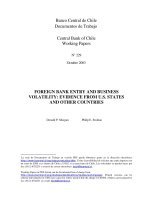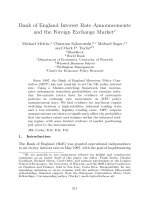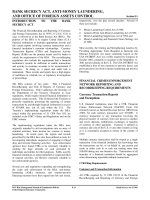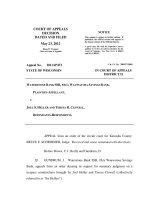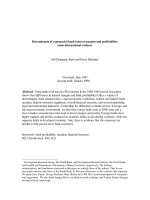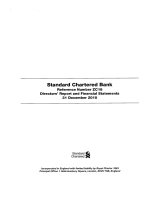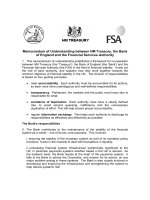WATERSTONE BANK SSB, F/K/A WAUWATOSA SAVINGS BANK, PLAINTIFF-APPELLANT, V. JOEL S. HELLER AND TERESA R. CLEWELL, DEFENDANTS-RESPONDENTS. ppt
Bạn đang xem bản rút gọn của tài liệu. Xem và tải ngay bản đầy đủ của tài liệu tại đây (67.63 KB, 13 trang )
COURT OF APPEALS
DECISION
DATED AND FILED
May 23, 2012
Diane M. Fremgen
Clerk of Court of Appeals
NOTICE
This opinion is subject to further editing. If
published, the official version will appear in
the bound volume of the Official Reports.
A party may file with the Supreme Court a
petition to review an adverse decision by the
Court of Appeals. See WIS. STAT. § 808.10
and RULE 809.62.
Appeal No. 2011AP473
Cir. Ct. No. 2009CV2680
STATE OF WISCONSIN IN COURT OF APPEALS
DISTRICT II
WATERSTONE BANK SSB, F/K/A WAUWATOSA SAVINGS BANK,
PLAINTIFF-APPELLANT,
V.
JOEL S. HELLER AND TERESA R. CLEWELL,
DEFENDANTS-RESPONDENTS.
APPEAL from an order of the circuit court for Kenosha County:
BRUCE E. SCHROEDER, Judge. Reversed and cause remanded with directions.
Before Brown, C.J., Reilly and Gundrum, JJ.
¶1 GUNDRUM, J. Waterstone Bank SSB, f/k/a Wauwatosa Savings
Bank, appeals from an order denying its request for summary judgment on a
trespass counterclaim brought by Joel Heller and Teresa Clewell (collectively
referred to as “the Hellers”).
No. 2011AP473
2
¶2 Waterstone brought a foreclosure action against the Hellers after
they defaulted on their mortgage. The circuit court granted Waterstone summary
judgment. The Hellers then amended their answer to include a counterclaim for
trespass due to Waterstone’s entering upon their property and placing a sign in the
window with its contact information and, eleven days later, changing the locks on
the house and installing a lockbox. Both Waterstone and the Hellers moved for
summary judgment on the trespass claim. The court denied both motions. In
denying Waterstone’s motion, the court concluded that even if Waterstone had
consent to first enter the property, a question of fact exists regarding the actions
taken by Waterstone when it returned to the property. On appeal, Waterstone
contends that the Hellers consented to all of its challenged actions by the terms of
the mortgage note and mortgage they previously signed.
1
We agree and reverse.
BACKGROUND
¶3 The relevant facts of record are not in dispute. Waterstone lent the
Hellers $1,117,500 to construct a home in Kenosha county. In addition to other
language regarding default, paragraph 12 of the mortgage note provides:
12. OPTIONS OF BANK IN CASE OF DEFAULT
….
The Borrower hereby assigns to the Bank as additional cash
collateral security all rents and profits derived from the
Property and all escrow funds paid to the Bank pursuant to
this Note. The Borrower does hereby appoint said Bank
agent for the management of the Property; and the Bank
shall at any time and without notice have the right to enter
upon, take possession of, and manage the Property,
including the right to hire and pay a property manager and
to collect the rents of the Property, including those past
1
The Hellers do not appeal the circuit court’s denial of their summary judgment motion.
No. 2011AP473
3
due, directly from the occupants or past occupants of the
Property, and bring or defend any action in connection with
said premises, which appointment and rights the Bank may
elect and exercise to accept in the event the Bank, in its
sole discretion, determines there has been a default or
breach of covenant by the Borrower. The failure on the
part of the Bank to exercise any of its rights hereunder shall
not be construed to prejudice its other rights or its rights
upon any other or subsequent default or breach of covenant.
(Emphasis added.)
The mortgage provides in relevant part:
The undersigned Mortgagor(s) … hereby mortgage(s) to
[the Bank] real estate in Kenosha County, Wisconsin
described as follows (hereinafter the “Property”): [legal
description of property] … hereby releasing and waiving
all rights under any homestead exemption laws and all
right to retain possession of said premises after any default
in payment or breach of any of the covenants or agreements
herein.
….
The Mortgagors hereby assign to the Mortgagee as
additional cash collateral security all rents and profits
derived from the property and all escrow funds paid to the
Mortgagee pursuant to the Note. The Mortgagors hereby
appoint said Mortgagee agent for the management of the
Property, and the Mortgagee shall at any time and without
notice have the right to enter upon, take possession of and
manage the Property, including the right to hire and pay a
property manager, and to collect the rents of the property,
including those past due, directly from the occupants and
past occupants of the Property, and bring or defend any
actions in connection with the property, which appointment
and rights the Mortgagee may elect to accept and exercise
in the event the Mortgagee, in its sole discretion,
determines there has been a default or breach of covenant
by the Mortgagors. The Mortgagee may elect from time to
time not to enforce some or all of the provisions of this
paragraph. (Emphasis added.)
2
2
The terms and conditions of the mortgage are incorporated into the mortgage note
through a separate paragraph in the note.
No. 2011AP473
4
¶4 The Hellers last payment on the note was made on June 4, 2009. On
August 7, 2009, Waterstone wrote to the Hellers advising them their account was
past due and informing them that action would be taken if they did not bring their
loan account current or enter into a payment plan. While some subsequent
negotiations did occur, the Hellers made no additional payments and they had no
further communication with Waterstone after October 9, 2009.
3
¶5 On October 25, 2009, Bryan Olen, an assistant vice president for
Waterstone, went to the property to make sure it was secure and see if anyone was
living there. He determined that no one was present at the property, and observed
that the overhead garage door was open and the door leading from the garage into
the house was unlocked. Olen secured the door from the garage into the house and
placed a sign in the front window that read: “For Information Contact WaterStone
Bank SSB 414.459.4210.” Olen returned to the property on November 5, 2009,
changed the locks, and placed a lockbox on the front door containing a key for the
locks. Four days later, Waterstone filed its foreclosure action against the Hellers.
The Hellers contacted Waterstone on November 24, 2009, asking if they could
access the house. Waterstone informed them they could access the property and
provided them with the lockbox combination.
DISCUSSION
¶6 We review de novo the circuit court’s decision on summary
judgment, applying the same methodology as the circuit court. Envirologix Corp.
v. City of Waukesha, 192 Wis. 2d 277, 287, 531 N.W.2d 357 (Ct. App. 1995).
3
The Hellers do not argue that they were not in default when Waterstone engaged in the
actions at issue in this case.
No. 2011AP473
5
Summary judgment “shall be rendered if the pleadings, depositions, answers to
interrogatories, and admissions on file, together with the affidavits, if any, show
that there is no genuine issue as to any material fact and that the moving party is
entitled to judgment as a matter of law.” WIS. STAT. § 802.08(2) (2009-10).
4
¶7 Here, the parties agree on the relevant facts. The question on appeal
is whether, by signing the mortgage note and mortgage, the Hellers consented to
Waterstone entering the property and placing a sign in the window with its contact
information on October 25, 2009, and changing the locks on the house and
installing a lockbox on November 5, 2009. To answer this question, we must
interpret the parties’ contract and apply the contract to the undisputed facts in this
case. These are matters of law we review independently of the circuit court.
Maryland Arms Ltd. P’ship v. Connell, 2010 WI 64, ¶21, 326 Wis. 2d 300, 786
N.W.2d 15.
¶8 In their counterclaim, the Hellers allege trespass. A trespasser is “a
person who enters or remains upon land in the possession of another without a
privilege to do so created by the possessor’s consent or otherwise.” Antoniewicz
v. Reszcynski, 70 Wis. 2d 836, 843, 236 N.W.2d 1 (1975) (quoting RESTATEMENT
(SECOND) OF TORTS § 329 (1965)). Thus, consent is a defense to a claim of
trespass. See Grygiel v. Monches Fish & Game Club, Inc., 2010 WI 93, ¶41, 328
Wis. 2d 436, 787 N.W.2d 6.
¶9 Waterstone argues that, as a matter of law, it did not trespass
because the Hellers consented to its actions on October 25 and November 5, 2009.
4
All references to the Wisconsin Statutes are to the 2009-10 version unless otherwise
noted.
No. 2011AP473
6
Waterstone points to the following language in paragraph 12 of the mortgage note,
and similar language in the mortgage,
5
as allowing it, in its sole discretion, to enter
upon and take possession of the property in the event of a default:
[T]he Bank shall at any time and without notice have the
right to enter upon, take possession of, and manage the
Property in the event the Bank, in its sole discretion,
determines there has been a default or breach of covenant
by the Borrower.
¶10 The Hellers respond that “paragraph 12 of the mortgage note only
comes into play when the house is being leased,” and thus Waterstone did not
have the right to enter, possess, and manage the property because there was no
lessor-lessee relationship. Absent a lessor-lessee relationship, the Hellers argue,
Waterstone was required to bring legal action before taking the actions it did on
October 25 and November 5, 2009, because “[o]nly a court-appointed receiver has
the power to take possession of the Hellers’ house if the house is not being
leased.” Additionally, the Hellers contend that even if the mortgage note and
mortgage permitted Waterstone to lawfully enter and take possession of the house
absent a lessor-lessee relationship or a court-appointed receiver, a question of fact
exists regarding whether Waterstone exceeded the scope of consent afforded by
the documents by placing its sign in the window on October 25 and then changing
the locks and putting a lockbox on the door on November 5 and not immediately
informing the Hellers of the access code for the lockbox.
6
5
Our analysis here focuses on paragraph 12 of the mortgage note. The mortgage itself
contains similar language. See supra, ¶3.
6
The Hellers also contend in their response brief that Waterstone committed wrongful
eviction by locking them out of the house. We do not address this issue because they raise it for
the first time on appeal. Brooks v. Hayes, 133 Wis. 2d 228, 241, 395 N.W.2d 167 (1986) (“The
general rule is that this court will not consider arguments raised for the first time on appeal or
review.”).
No. 2011AP473
7
¶11 We hold that by signing the mortgage note and mortgage, the Hellers
consented to Waterstone entering upon, taking possession of, and managing the
property upon default, without first requiring a lessor-lessee relationship or legal
action. Further, Waterstone’s actions on October 25 and November 5 were within
the scope of the consent afforded by the documents.
¶12 The Hellers state generally that paragraph 12 of the mortgage note
“basically operate[s] as an assignment of rents.” They argue that, absent the
institution of legal action, paragraph 12 only would permit Waterstone “to enter
upon, take possession of, and manage the Property” in the event of a default if the
property also were leased. The Hellers fail to explain how the specific terms lead
to that conclusion.
¶13 The plain language of paragraph 12 does not support the Hellers’
position. Paragraph 12 states that, in the event of a default by the Hellers,
Waterstone “ha[s] the right to enter upon, take possession of, and manage the
Property.” The preceding sentence does “assign[] to [Waterstone] as additional
cash collateral security all rents and profits derived from the Property and all
escrow funds paid to [Waterstone] pursuant to this Note.” However, nothing
about this language suggests the rights granted to Waterstone to enter upon, take
possession of, and manage the property in the event of a default do not “come[]
into play” absent the existence of a lease.
¶14 Other language related to the collection of rents also shows that the
rights to enter upon, take possession of, and manage the property do not depend on
a lessor-lessee relationship. The relevant provision of paragraph 12 states:
[Waterstone] shall at any time and without notice have the
right to enter upon, take possession of, and manage the
Property, including the right to hire and pay a property
No. 2011AP473
8
manager and to collect the rents of the Property, including
those past due, directly from the occupants or past
occupants of the Property …. (Emphasis added.)
Far from creating a condition precedent to the rights to enter upon, take possession
of, and manage the property, this provision clarifies that the rights to hire and pay
a property manager and to collect rents are separate from the right to enter upon
and take possession of the property and are actually a subset of the broad right to
manage the property.
¶15 Our interpretation of paragraph 12 is consistent with the terms of the
first paragraph of the mortgage, which state in relevant part:
The undersigned Mortgagor(s) … hereby mortgage(s) to
[Waterstone] real estate located in Kenosha County,
Wisconsin described as follows (hereinafter the
“Property”): [legal description of property] … hereby
releasing and waiving all rights under any homestead
exemption laws and all right to retain possession of said
premises after any default in payment or breach of any of
the covenants or agreements herein. (Emphasis added.)
By this language, the Hellers “releas[ed] and waiv[ed] all right to retain
possession of” the property “after any default in payment.” Thus, it is not
surprising the Hellers gave Waterstone the right to “enter upon, take possession of,
and manage” the property upon default through paragraph 12 of the mortgage
note.
¶16 The Hellers also contend: “Waterstone needed to file a lawsuit and
have the court appoint a receiver before it performed the actions it did with respect
to the Hellers’ house. Only a court-appointed receiver has the power to take
possession of the Hellers’ house if the house is not being leased.” This is
conclusory; the Hellers again identify no specific terms in the contract that support
this position.
No. 2011AP473
9
¶17 The Hellers do point to another paragraph in the mortgage note
granting authority to a court to appoint a receiver if a court action is filed, and
detailing the powers and responsibilities of a receiver, including the power to take
possession of the property, in such a circumstance. That provision provides in
part:
Upon the filing of any complaint, or the filing of any action
to foreclose the Mortgage in any court having jurisdiction,
such court may, at any time and without notice to the
Borrower appoint a receiver to take possession of the
Property, with the authority and power to rent and lease the
Property; to maintain the Property, to collect all rents and
profits; and to pay expenses incurred Monies received
by said receiver shall be applied toward expenses and
the amount due the Bank. Upon foreclosure and sale of the
Property, proceeds shall be applied as follows: [toward
expenses and debt]. In case of payment of the Note Debt
prior to the confirmation of sheriff’s sale but after the
filling of any complaint all costs and disbursements
incurred shall be added to the Note Debt.
¶18 Nothing about this provision suggests Waterstone did not have the
Hellers’ consent under the plain language of paragraph 12 to enter upon, take
possession of and manage the property in the event of a default, and without the
need to file a lawsuit. This provision merely addresses what happens if legal
action is filed.
¶19 By signing the mortgage note and mortgage, the Hellers consented to
Waterstone entering upon, taking possession of, and managing the property in the
event of a default and without need of a lessor-lessee relationship or legal action.
¶20 We next consider the scope of the consent the Hellers granted
Waterstone through the mortgage note and mortgage. The Hellers contend that
Waterstone’s actions of placing a sign with its name and contact information in the
window, changing the locks, and placing a lockbox on the front door, without
No. 2011AP473
10
immediately informing the Hellers of the code for the lockbox, exceeded the scope
of the Hellers’ consent.
¶21 As stated, the mortgage note permits Waterstone to enter upon, take
possession of, and manage the Property. “Possess” and “manage” provide a wide
breadth of authority. To “possess” means “to have as belonging to one,” “to make
(someone) owner, holder, or master, as of property, information, etc.,” and “to
occupy or hold.” RANDOM HOUSE DICTIONARY OF THE ENGLISH LANGUAGE 1509
(2d ed. 1987). To “manage” means “to take charge or care of,” “to handle, direct,
govern, or control in action or use,” and “to conduct business, commercial affairs,
etc.; be in charge.” Id. at 1166. Waterstone’s actions of placing a sign with its
contact information in the window, changing the locks on the property, and
placing the key for the locks in a lockbox, regardless of whether Waterstone
immediately informed the Hellers of the combination, were within the scope of
“tak[ing] possession of” and “manag[ing]” the property. Indeed, the Hellers
actually concede this themselves in another section of their brief, where they
argue that the complained of actions were consistent with “manag[ing] the
Property”: “WaterStone performed certain actions consistent with it being the
manager of the Hellers’ house such as placing a WaterStone sign in the window,
changing the locks, and placing a lockbox on the front door.” We agree.
¶22 For the foregoing reasons, we hold that, as a matter of law, the
Hellers consented to Waterstone’s actions with regard to the property at issue and,
therefore, Waterstone cannot be found to have committed a trespass. In hindsight,
the Hellers may wish they had not given such broad authority to Waterstone in the
event they defaulted on the $1,117,500 loan Waterstone provided them.
Nonetheless, they did.
No. 2011AP473
11
¶23 We remand for the circuit court to grant summary judgment on the
trespass counterclaim in favor of Waterstone.
By the Court.—Order reversed and cause remanded with directions.
Not recommended for publication in the official reports.
No.
2011AP473(D)
¶24 REILLY, J. (dissenting). I respectfully dissent. The majority
opinion reverses Wisconsin law which requires banks to begin a foreclosure action
or obtain a receiver via court action in order to obtain possession of their mortgage
customer’s home. The majority opinion allows a bank to unilaterally declare a
default and to obtain the remedy of possession without court oversight. The old
saying that “possession is nine-tenths of the law” is apropos to the majority
opinion. Today’s decision will result in foreclosure becoming the option of last
resort rather than the required course of action.
¶25 It has long been the law in Wisconsin that “[a] mortgage in this state
merely gives a lien upon the land mortgaged for the sum of money secured
thereby.” Tobin v. Tobin, 139 Wis. 494, 498-99, 121 N.W. 144 (1909). It has
also long been the law in Wisconsin that legal title to and the right to possession of
mortgaged property does not rest in a mortgagee (bank) but continues in the
mortgagor (homeowner) until terminated by sale on foreclosure or the
appointment of a receiver in a foreclosure action to prevent waste. Zimmerman v.
Walgreen Co., 215 Wis. 491, 496, 255 N.W. 534 (1934).
¶26 That was the law until today. The majority concludes, supported
only by the contractual language of the note and mortgage, that a bank
(mortgagee) may seize possession of a home when the bank, “in its sole discretion,
determines there has been a default or breach of covenant by the borrower.”
While a mortgagee has the right to protect its interest in the collateral (such as the
bank’s action on October 25 when it locked up the Hellers’ home), a mortgagee
does not have the right to unilaterally take possession of a property it does not
No. 2011AP473(D)
2
own. We do not allow landlords (who own the property) to engage in self-help
evictions, yet the majority decision allows a mortgagee to do what an owner of
property cannot—take possession. I agree with the circuit court that it is for the
jury to determine whether the bank trespassed upon the Hellers’ property.
¶27 The bargaining power between a homeowner and his or her creditor
changes measurably when the homeowner is locked out of his or her home and the
creditor literally holds the keys to get back in. Foreclosure/appointment of a
receiver is the procedure Wisconsin has long required of creditors who seek
possession of property they hold a security interest in. As the decision authorizes
a bank to take property that it does not own without court approval, I respectfully
dissent.

